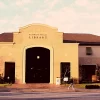|
Getting your Trinity Audio player ready...
|
Alyx Kim-Yohn was busy attending to their normal duties as circulation manager at the Huntsville-Madison County Public Library system last Monday when their branch manager pulled them and others into a meeting to discuss moving children’s books to the adult section.
In that meeting, the branch manager shared with them a spreadsheet of book titles in the library’s catalog, and informed them that the children’s books listed were to be moved into the adult nonfiction section immediately by order of HMCPL executive director Cindy Hewitt.
According to Kim-Yohn, the branch manager told them that Hewitt coordinated with the systems librarian to cross-reference titles in the library’s catalog against a list by the Alabama Public Library Service of challenged titles.
When Kim-Yohn went to check the APLS list for themself, it wasn’t there—because that list does not yet exist. The APLS board did vote unanimously to create a system for Alabama parents to flag titles, which will be collated into a list that will then be distributed to libraries as a resource. But APLS will not be vetting the challenges, and libraries will not be required to do anything with the information. To APR’s knowledge, the APLS website does not yet even have the a page for parent to submit complaints.
When Kim-Yohn asked to follow up on this, they found that the list had obviously not been cross-referenced against the nonexistent APLS list—instead, the flagged titles were collated based on keywords, or “subject headings.” The spreadsheet includes all subject headings for the books, but the headings they have in common help to reveal what some of these search terms were.
“Lesbian.” “Gay” “Gender.” “Identity.” etc.
APR placed a call to Hewitt Wednesday afternoon, but was told that she is out of office and would be for a few days. A message was left for the public relations department, but APR did not receive a response before publishing time.
While APR has not spoken with Hewitt or the systems librarian to verify how titles were selected, there is further evidence of the process within the list itself.
The first 10 books on the spreadsheet all have subject headings that make it clear why they were included in the list: “gay politicians,” “gay parents,” “gender expression,” “lesbian mothers,” “gender identity,” “gay pride,” etc.
Then the reader comes to the 11th book listed, “Read me a story, Stella.” Unlike the first 10 books, this one does not seem to have anything to do with LGBTQ+ content. But if the reader were to scroll over to the call number, they would find “E GAY.” The book’s author is Marie-Louise Gay, enough to land this book on the list of kids’ books to be moved—without examination—to the Adult Nonfiction section.
{{CODE1}}
At the Prattville Public Library, where this campaign of challenging books appears to have begun, citizens connected with Clean Up Prattville have thus far challenged 48 books by filing reconsideration forms. That group has expanded to the statewide group Clean Up Alabama which called on APLS to act, leading APLS member and ALGOP Chair John Wahl to recommend the list of flagged books. At last check by APR, the Clean Up Alabama site had flagged exactly 100 books as inappropriate on its website.
The Huntsville spreadsheet has 246 titles to be considered.
Kim-Yohn confirmed to APR that the request was for all children’s books to be moved directly to Adult Nonfiction, while Young Adult Fiction books should be taken on a case-by-case basis.
APR’s review of the list shows 70 titles in the juvenile section that would fall under that order for immediate relocation.
That list includes a graphic novel based on the highly popular Avatar: The Last Airbender animated series that has experienced a resurgence after being picked up by Netflix—and which doesn’t have any apparent cross-section with any of the parameters that the search seems to be based on. However, the sequel series Legend of Korra includes a lesbian relationship which is shown in the graphic novel, which also appears on the Huntsville list to be moved.
A quick search of the list shows the word “gay” appears in 86 of the records; the word “gender” in 76; the word “lesbian” in 68; while “racism” or “race relations” factor into a handful. A search for the word “sexual” returned 38 results—challengers have often said that they are interested only in moving sexually explicit content and are not going after specifically LGBTQ content, although they have explicitly spoken out against gender ideology and have clearly targeted books with LGBTQ storylines.
A closer review of the records containing the word “sexual” show that the result isn’t necessarily about “sexually explicit content.” Three of the 38 entries are copies of “It’s Perfectly Normal,” a controversial 30-year-old sex education book that includes cartoonish illustrations of nudity, including child nudity. Most, if not all, of the remaining 35 entries were included for words and phrases including “asexual,” “bisexual,” transsexual,” “sexual minorities,” and “sexual orientation.” Or they were otherwise included in records that also included LGBTQ content.
At branches like the one Kim-Yohn works at, librarians have been sluggish to make the changes—Kim-Yohn said it goes against the library’s own policies and against the principles of intellectual freedom. But the North Huntsville Library had already begun the process of relocating the books, and APR obtained screenshots from the HMCPL catalog over the last two days that show the books had been reclassified as being in the adult section.
However, APR’s own review of the catalog late Wednesday night showed the books as classified in their previous juvenile locations, and the leader of a group of concerned citizens in Huntsville confirmed to APR that books that had previously been removed from the shelves are back in their rightful place.
That appears to be connected to a “pause” that has been placed on the order to relocate books until the library can receive “community feedback.” The librarians first heard about the relocation order Monday, less than 48 hours before the quarterly library board meeting, which meant citizens didn’t have time under board policy to sign up to speak. However, due to a large showing at the board meeting, the group was able to express its concerns.
Dr. Marisa Allison, a leader of the Huntsville chapter of Read Freely Alabama, has been working to figure out what’s been happening and has requested numerous public records from officials in relation to the order. Allison is a Hunstville native and citizen, a card-carrying member of the library—or the “lifebary” as her 5-year-old son calls it—and is in a same-sex marriage.
“What we know is this list is not about sexual content, but about LGBTQ books,” Allison said. “One of the books is about a little girl who has two gay dads during 9/11. It’s a fiction story about her trying to navigate Manhattan and not knowing where her dads are.”
Allison has requested all public meeting minutes from the past year as well as internal library communications such as email, text and Slack messages relating to the relocating of books. These writings are all public record under Alabama’s Open Records Act.
“We’ve already had some of this decision-making happening at the state level,” Allison said. “Doing this preemptively carte blanche seems to me a like a very different move. I’m shocked that here in one of the more progressive cities in the state that we would be doing the worst possible scenario of this debacle.”
Kim-Yohn stressed that Hewitt has done a lot of good for the library system.
“She’s done some wonderful things: she’s increased pay, she’s gotten us funding that nobody else could,” Kim-Yohn said. “I think she thinks she is doing the best she can with what she’s got; but her decisions unfortunately have been unjust. When we were told about this, it was prefaced with the statement that ‘the director knows this is a bad decision.'”
Sources within the library have also told APR of concerns that Hewitt has said she feels she is accountable to her church on how she handles the books. APR has not yet been able to ask Hewitt about that or further confirm those statements through library sources.














































